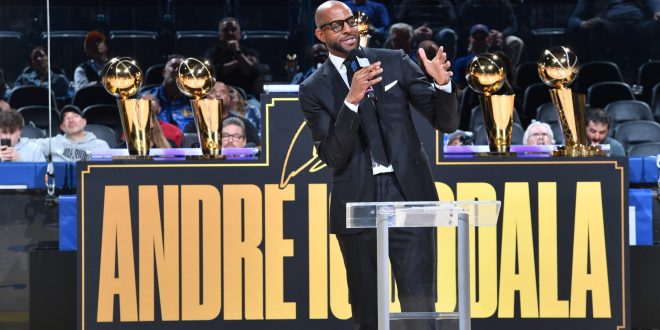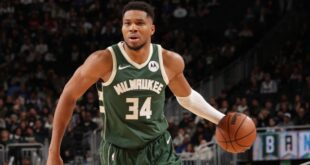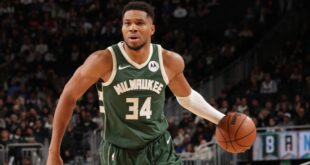•Subscribe to NBA League Pass TODAY
SAN FRANCISCO (AP) — When Andre Iguodala made the decision to join the Golden State Warriors in 2013, there was no assurance that he would become part of a championship legacy. At that moment, Stephen Curry had yet to attain All-Star status, while Klay Thompson and Draymond Green were merely beginning their careers.
Ultimately, Iguodala’s contributions and strategic choices played a pivotal role in securing four championships, notably earning the NBA Finals MVP award in 2015, where he led the Warriors to their first title in 40 years.
On Sunday, the franchise paid tribute to Iguodala by retiring his jersey No. 9 and elevating it to the rafters at Chase Center.
“It’s been a wild journey, but a beautiful blessing,” Iguodala remarked during his address.
9 Foreverpic.twitter.com/NqW0CiTqGt
— Golden State Warriors (@warriors)February 23, 2025
Iguodala became the seventh player in franchise history to have his number retired, joining the ranks of Rick Barry (24), Wilt Chamberlain (13), Nate Thurmond (42), Al Attles (16), Chris Mullin (17), and Tom Meschery (14).
Before his time with the Warriors, Iguodala had built an impressive career, earning a reputation as a solid defender and a reliable starter over nine seasons. In Golden State, he embraced the role of a veteran leader, acknowledging the talent surrounding him.
“You sacrificed ego for excellence,” Curry expressed during the retirement ceremony.
Curry remarked that Iguodala brought confidence, intelligence, and maturity to the emerging team, noting how he transitioned from being the primary star with the Philadelphia 76ers to the vital “glue” that held the Warriors together.
“The legacy of Andre Iguodala with the Warriors is much more than just championships,” Curry said.
“He recognized how special this opportunity was and wanted to be a part of it,” stated Warriors coach Steve Kerr before Sunday’s 126-102 victory over the Dallas Mavericks. “Acquiring him was a significant achievement. The Warriors weren’t drawing many free agents at the time, so signing Andre was undoubtedly a crucial decision.”
In his inaugural season with the Warriors at the age of 30, Iguodala had never previously come off the bench in his decade-long career. However, when Kerr took the helm the following year, Iguodala willingly accepted a reserve role, describing it as a “great, unique situation” made easier by Curry, Thompson, and Green.
“It’s uncommon in professional sports to witness someone still in their prime willingly step aside for emerging talent,” the 41-year-old Iguodala commented prior to the game.
This selflessness led to a championship title in 2015, with Iguodala becoming the first player to earn NBA Finals MVP honors without starting every game in the series. It was coach Kerr who chose to elevate Iguodala to the starting lineup after falling behind 2-1 to the Cavaliers in the 2015 Finals, assigning him the critical task of guarding then-Cleveland superstar LeBron James.
He averaged 16.3 points, 4.0 assists, and 5.8 rebounds as the Warriors triumphed over the Cavaliers in six games.
Following the victory, Iguodala was named the 2015 NBA Finals MVP, marking the Warriors’ first championship in 40 years.
“That was the ultimate affirmation of everything I’ve always believed about the game, and I believe that others recognize it too,” Kerr reflected. “The sacrifices, the triumphs, and how everything came together—none of that went unnoticed.”
Iguodala was selected as the No. 9 pick in the 2004 NBA Draft out of Arizona and played in 1,231 games throughout his career. He spent eight seasons with the Philadelphia 76ers, one with the Denver Nuggets, six with the Warriors, two in Miami, and came back to Golden State for his final two seasons. He was part of championship teams in 2015, ’17, ’18, and 2022.
Iguodala highlighted the Warriors’ relentless drive to succeed, especially after their first championship win.
“When we captured the first title, it felt as though we needed to do it again to prove it wasn’t a one-time occurrence,” Iguodala noted. “Then, after the second win, the mindset shifted to needing to do it again because nobody could compete with us, and we were expected to win again.”
He continued, “That’s the unique nature of elite athletes—their insatiable hunger. This characteristic was woven into the DNA of every team member and became a core aspect of the organization.”
 NBA News NBA News, Match Reports and Updates
NBA News NBA News, Match Reports and Updates



